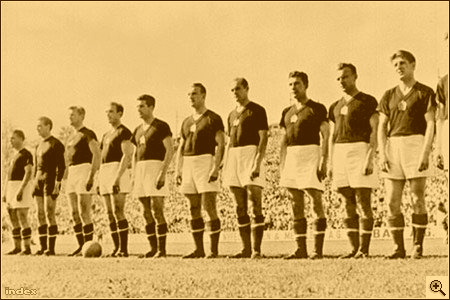|
Puskás's Peers
Merited Only Terse, Belated Notices
Attila Ághassi
Friday, 8 December 2006, 12:37
When
we heard, here at home, even belatedly, of the deaths of three members of
Hungary's best-known football team, it would appear as only a sentence in
the sports papers of that time. Kocsis fell from a hospital window, and
Gyula Lóránt suffered a heart attack while sitting on the substitute's
bench, although that only came to light years later. Up till now, only
József Bozsik and Nándor Hidegkuti have received proper farewell tributes.
It may be
an exaggeration to claim that the Golden Team captain, Ference Puskás, who
died on 17 November, is now receiving final respects in place of his
earlier deceased peers. It is as though the conscience of the country were
speaking. Indeed, under the dictatorship, his teammates could not receive
the honours that they undoubtedly deserved. After all, they made up
Hungary's greatest football team, which went unbeaten for more than three
years. The Golden Team's name and reputation became known throughout
Europe, its players revered as football gurus. It was only here at home,
of all places, that they were forgotten, where their fame became
uncomfortable for some.
Zakariás Was the First Team Member to Pass Away
People
were usually informed late and often perfunctorily about the death of
those who died during the dictatorship. There was no possibility of having
a state funeral. Anyway, it was basically not an option for football
players - although, there were some very rare exceptions, such as József
Bozsik.

It was
1971, when the 47-year-old József Zakariás died, the first from the team
that had won the Olympic Games and had earned a silver medal at the World
Cup. His death notice was published as a short item in Népsport (People's
Sport), eight days after he had died. He received little attention, even
though he played by the rules. He never defected. He received permission
to go to Africa, and there he caught a mysterious disease which caused his
early death.
Bozsik
Deserved the Farewell Honours
Still,
Bozsik was paid his rightful last respects in 1978. Since he suffered from
heart problems, he did not undertake being captain more than once. The
brains of the mid-field, he was given a grand organised farewell. His
coffin was carried by his teammates, and thousands of people could offer
their condolences.
There was no chance at all to recognise Sándor Kocsis's merits, even
though he had achieved fame in Barcelona, because he defected after the
revolution. He plazed in the European Championship Cup in 1961. Previously,
he had scored four goals against Wolverhampton, while playing with a
broken shoulder.
Kocsis's Death a Suicide or an Accident?
|
Kocsis's death notice was published with a delay of three days. "Hungarian
football player Sándor Kocsis, who played for Hungary 68 times, died
under tragic circumstances and was buried in Barcelona on Tuesday,'
reported Népsport. The obscure accident has yet to be clarified. It
is still unknown whether he jumped out of the window of the
Barcelona hospital on purpose. Or could it have been an accident?
While he was waiting for his wife, he simply could have slipped and
fallen - though, according to contemporary gossip, he could have
been pushed out. |
|
The Golden Team Line-up: |
Gyula Grosics
(1926-)
Jenő
Buzánszky (1925-)
Gyula
Lóránt (1923-1981)
Mihály
Lantos (1928-1989)
József
Bozsik (1925-1978)
József
Zakariás (1924-1971)
László
Budai (1928-1983)
Sándor
Kocsis (1929-1979)
Nándor
Hidegkuti (1922-2002)
Ferenc
Puskás (1927-2006)
Zoltán
Czibor (1929-1997) |
|
Only four
years later was it permitted to write about Kocsis, in the obituary of his
forward mate László Budai. Though Budai was an integral member of the
team, he was never deemed worthy of a separate biography. He was buried in
Rákoskeresztúr without any formalities.
Europe
Stunned at Lóránt's Death - Only Hungary Did Not Know
Gyula
Lóránt had the most shocking death of anyone on the team. He died in
Szaloniki, in 1981, suffering aheart attack on the substitute's bench. He
team was playing a league match at the time. All Europe was astonished at
the excellent full-back's death; nevertheless, not a single word could be
published about him in his native country. As Lóránt's family lived in
Germany at the time, he was laid to eternal rest in the small city of
Endingen. Sports historian Pál Hencsei hastened to add that, after the
transition, the proposition was raised to bring home his mortal remains
and lay him to eternal rest in Budapest with the honours he deserved;
however, his family did not approve.

Lantos
passed away on New Year's Eve 1989, after the transition. At that time,
Hungary had too many problems on its hands to give Lantos a dignified
farewell.
Hidegkuti Paid Last Respects with Great Dignity
Zoltán
Czibor, who returned to Hungary when it was already a democratic country,
lived only a few years at home. He suffer from cancer, which defeated him
in 1997. he was laid to eternal rest in his town of Komárom.
In 1998, the right-wing government realised the significance of the team,
its unprecedented success, and that the four surviving members had
garnered exceptional interntional fame. Nándor Hidegkuti, the first of the
aforementioned four players to die, had achieved great international
success as a coach. At his funeral, Sports Minister Tamás Deutsch
delivered the eulogy, and the ceremony was broadcast live. Thousands
followed the central forward, who scored three of the goals in the victory
at Wembly, on his final journey to Óbuda Cemetery.
Puskás, having been last century's best-known Hungarian, is to receive a
farewell on Saturday worthy of heroes and heads of state.
AThere are still two surviving team members: Gyula Grocsis (81) and Jenő
Buzánszky (82).
Source:
Index |